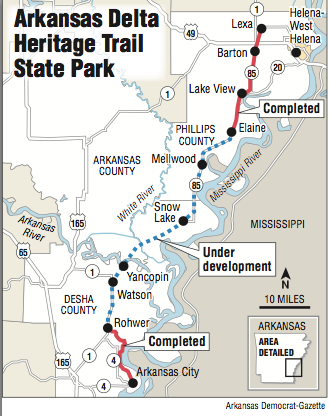A proposed facility at the southern end of the Delta Heritage Trail in Arkansas City will replicate the architecture of an old train depot and embrace the history of the railroad that helped develop the region, state parks officials said.
Construction began on the $890,000 trailhead building Wednesday and will feature picnic sites, restrooms and information about the area, said Meg Matthews, a spokesman for Arkansas State Parks. It anchors the end of a 14.4-mile pedestrian and bicycle trail that has been converted from old Union Pacific Railroad tracks that traveled through the area.
The railway, the first to be built west of the Mississippi River, was called the Route of the Eagles and connected St. Louis with Lake Charles, La., and New Orleans. The Delta Eagle carried passengers through the Delta, and other trains hauled lumber and agricultural goods from Arkansas towns that were thriving in the late 1800s and early 1900s, Matthews said.
In 1992, the Union Pacific Corp. donated its 73-mile right-of-way in Arkansas to the state to be converted into trails. The national Rails to Trails Conservancy program, a nonprofit organization based in Washington, D.C., has overseen the conversion of 22,880 miles of railways to pedestrian, hiking and bicycle trails in all 50 states.
The longest Rails to Trails route in the country is the Katy Trail State Park, a 240-mile corridor that begins in Machens, Mo., and follows the Missouri River until it veers southwest and ends near Clinton, Mo.
The trail is the template for the completion of the Delta Heritage Trail in Arkansas, Matthews said.
In addition to the 14.4-mile trek from Rohwer to Arkansas City, another 20.6 miles of "rail-trails" run from Helena-West Helena to Elaine. The state Parks Department plans to connect the two stretches and create an 84.5-mile path, which will be one of the longest pedestrian and bicycle routes in the state.
Work on the trailhead facility is expected to be completed by early next summer, said Randy Roberson, manager of planning and development with the Arkansas Department of Parks and Tourism.
"Arkansas City used to have an old train depot," Roberson said. "The concept is to make this [facility] look like that."
Robert Moore, an Arkansas State Highway Commission member who lives in Arkansas City, said in a state parks news release the new facility should be a draw for tourism in the Desha County town.
"The construction of this new trailhead facility is exciting for a little city of 366 people," Moore said in the release. "It is tremendously rich in history. It has seven buildings on the National Register of Historic Places. It is surrounded by 10,000 public wildlife acres. It's the only major public access to the Mississippi River in the state of Arkansas.
"People are going to go, 'My goodness, something's really happening down here.'"
At the northern end of the trail, the Delta Heritage Trail State Park in Helena-West Helena has seen increases in visitors over the past four years, said park interpreter Maggie Howard.
From July 2013 to July 2014, 6,809 people visited the park, she said. Two years later, from July 2015 to July 2016, 10,135 people came to the park.
That number doubled during the next 12 months as 20,410 people visited the trails, Howard said.
The park offers campsites and tours of the trail. Howard said kayak tours of the nearby Mississippi River also are available.
"We focus on the history of the railroad," Howard said. "Helena was a huge lumber town, and the trains used to haul it."
Most of the Rails to Trails Conservancy trails focus on the area's history and the preservation of the nature along the former railways, said Brandi Horton, a spokesman for the organization.
The idea to convert railroad tracks into trails began in the 1950s but didn't get much attention until Sept. 25, 1963, when naturalist and illustrator May Watts wrote a letter to the editor of the Chicago Tribune about using abandoned train tracks. She suggested turning the former Chicago, Aurora and Elgin Railway, which shut down in 1961, into a corridor between Chicago and its suburbs.
"If we have courage and foresight, such as made possible the Long Trail in Vermont and the Appalachian Trail from Maine to Georgia ... then we can create from this strip a proud resource," Watts wrote.
The letter gained an outpouring of public support, Horton said, and within months Illinois Prairie Path Corp. was formed. The first trail along the Chicago, Aurora and Elgin Railway was developed in 1967.
"This is an important effort to preserve public access to land," Horton said.
Howard said that while the trails are mostly used by outdoor enthusiasts for hiking and biking, they also serve as connectors between towns for people.
"Some who don't have transportation can use the trails to go to stores, to work or other places," Howard said.
Recently, officials in Memphis and West Memphis built a walkway over the Mississippi River, connecting the two cities, basing the project on the Rails to Trails Conservancy programs. The walkway also winds through several miles of trails along the western edge of the river in West Memphis.
Parks officials hope to eventually link that section with the Delta Heritage Trail to create a pathway that traverses much of the state, Roberson said.
"The biggest obstacle is in the middle [of the Delta Heritage Trail] where we have to cross the Arkansas and White rivers," Roberson said. "We have some trestle bridges in place, but they will need to be rehabbed for pedestrian traffic.
"People often think the Delta is flat, but there are a lot of trees in the bottomland of the Big Woods," he said, referring to 550,000 square acres of hardwood forest near the convergence of the White and Arkansas rivers.
"It'll take some time to connect it all, but we're hoping it catches on," he said.
State Desk on 08/07/2017

